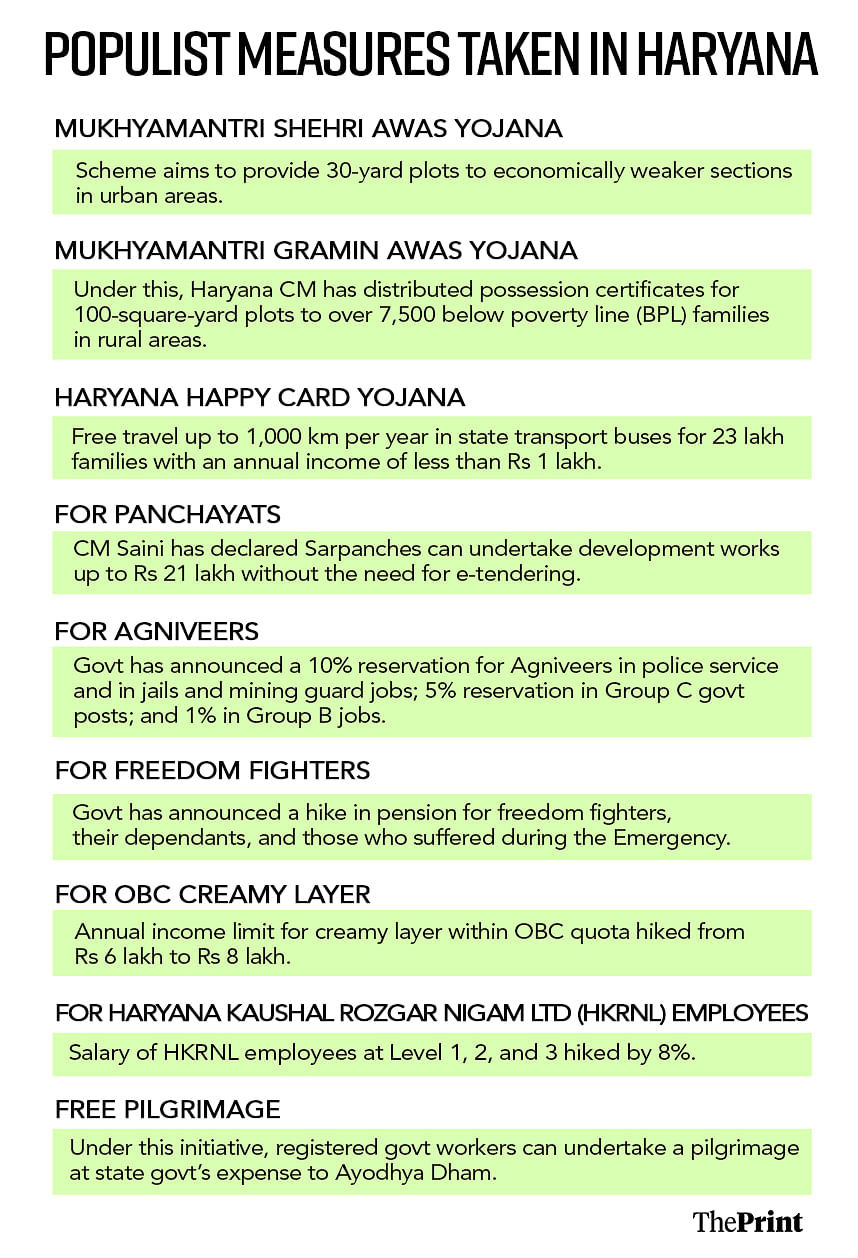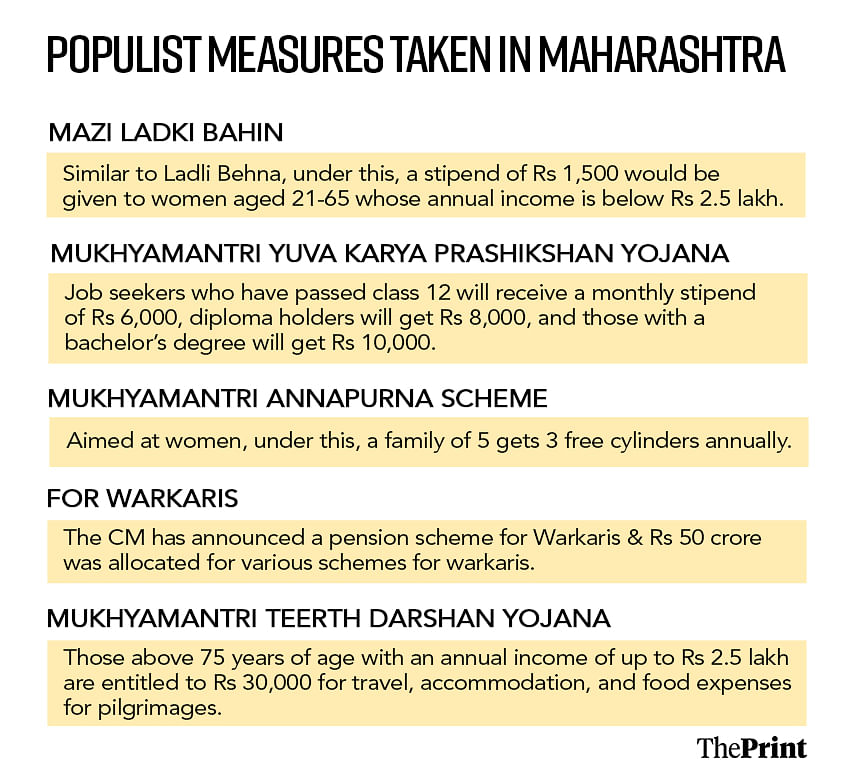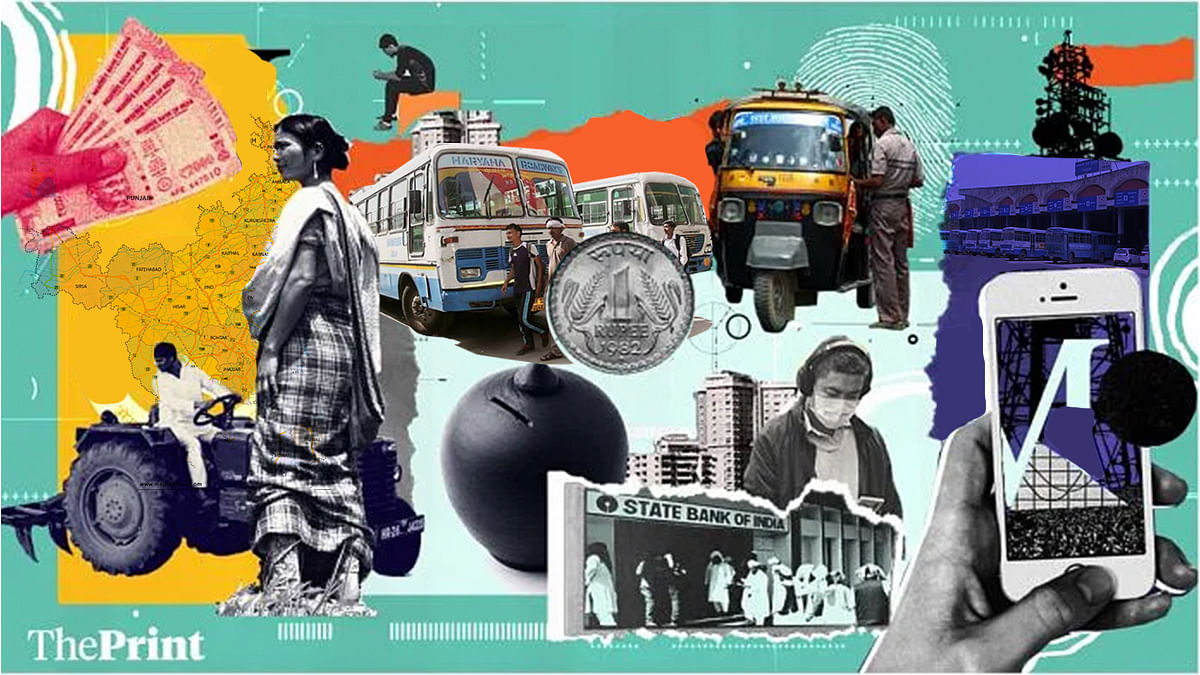From subsidised gas cylinders, providing fortified milk to school girls, a higher quantum of loans for self-employment, and a cess waiver for farmers in Haryana, to stipends for women, the youth, members of the Warkari sect and free pilgrimages for senior citizens in Maharashtra, the two states are leaving no stone unturned to keep the people happy in run up to polls.
“If we look at the Lok Sabha results, people were very upset with the ruling government and it was reflected in the results. So, to fill that gap, such kinds of schemes are being brought. Now, whether people respond to them or not needs to be seen. However, they do leave an impact to an extent because whoever gets these instalments, by word of mouth, tends to make the schemes popular,” Dr Sanjay Patil, a researcher with the Mumbai University’s politics and civics department, told ThePrint.
“This is a revdi (sop) in a way. The prime minister himself is against this culture, but the BJP governments in both states are resorting to it,” he added.
In Haryana, the ruling BJP suffered a setback, losing 5 out of 10 Lok Sabha seats as against in 2019 when it had won all 10. In terms of assembly segments, this translates to a loss in 46 of a total 90 seats.
In Maharashtra, the Mahayuti government, comprising the Shinde-led Shiv Sena, BJP and the Ajit Pawar-led Nationalist Congress Party (NCP), won just 17 of the 48 Lok Sabha seats in Maharashtra. The rival Maha Vikas Aghadi (MVA), which comprises the Shiv Sena (Uddhav Balasaheb Thackeray), the Congress and the NCP (Sharadchandra Pawar), won 30 seats. An independent, a Congress rebel who eventually extended his support to the MVA, won the 48th seat.
Local issues played a significant role in the recent parliamentary elections, including the discontent of onion farmers in Nashik and the Maratha quota protests in Marathwada. These challenges are unlikely to fully dissipate by the time of the assembly elections in October, and the Mahayuti is pulling out all stops to get people back on their side.
Former chief minister and Leader of the Opposition in Haryana Legislative Assembly Bhupinder Singh Hooda said the BJP is making “baseless announcements it cannot implement” as it is nervous about a clear defeat in the assembly elections.
Speaking to ThePrint Thursday, Hooda emphasised that the minimum support price (MSP) for crops is set by the central government, not the state.
The Saini government had, earlier this week, announced the procurement of 24 crops instead of the current 15.
Hooda pointed out that the central government has not mentioned MSP guarantees in this year’s budget, questioning the basis on which the state government had made such an announcement, and challenged the BJP to bring a bill in parliament to guarantee MSP.
“With Haryana elections two months away and the code of conduct to be imposed in a month, the BJP’s MSP talk is ill-timed, as no crops will come to market within the next month,” Hooda argued.

In Maharashtra, schemes like Mazi Ladki Bahin Yojana, Mukhyamantri Yuva Karya Prashikshan Yojana and providing pension for Warkaris, among others, have been announced.
Speaking to reporters in Pune Thursday, Sharad Pawar implied that the setback the Mahayuti suffered in recent Lok Sabha polls has forced it to think about the people’s welfare by launching new schemes.

“It is commendable that the welfare of brothers and sisters is being addressed, but this magic is purely due to the Lok Sabha poll votes. If voters cast their votes wisely, then all sisters, brothers, and others will be remembered,” he said.
Also read: Haryana chief secy Kaushal retires after 4 months’ leave. Surprise over ‘role model’ officer’s exit
Keeping voters happy
In Haryana, CM Saini Wednesday announced that 46 lakh families with an annual income of less than Rs 1.80 lakh, who are beneficiaries under the Pradhan Mantri Ujjwala Yojana, will now receive gas cylinders for Rs 500.
He also announced that under the Mukhyamantri Dugdh Uphaar Yojana, fortified milk will be provided to schoolgirls aged 14 to 18 for 150 days to combat malnutrition, benefiting around 2.65 lakh adolescent girls.
Some of his other announcements included a hike in the loan amount for self-employment under the Haryana Matrishakti Udyamita Yojana from Rs 3 lakh to Rs 5 lakh. The revolving fund for self-help groups (SHGs) under this scheme was raised from Rs 20,000 to Rs 30,000, and the monthly honorarium for Group Sakhi increased from Rs 150 to Rs 500.
The Haryana CM also announced the waiver of Rs 130 crore pending abiyana (cess on canal water) and Rs 54 crore abiyana charged from farmers annually.
The popular schemes announced by the Mahayuti government in Maharashtra, offering monthly financial support to various groups — such as women, youth, Warkaris, and senior citizens — will add to the state’s financial burden. The government recently presented supplementary demands of an additional Rs 96,000 crore in a state already carrying a debt exceeding Rs 7 lakh crore for 2023-24.
Political commentator Prakash Bal said, the populist schemes in Maharashtra are in line with Shinde’s way of playing politics, but is not a good sign for the state’s economy.
“But giving out doles is very much Eknath Shinde’s style. That is how his politics has been, be it as a corporator or a CM,” Bal said.
Jyoti Mishra, Research Associate, Lokniti, Centre for the Study of Developing Societies (CSDS), however, said that in the current political context, no party can escape the allure of welfare measures, or revdi culture, to secure electoral victories.
“The BJP, which previously criticised this practice, is now embracing it in the lead-up to the assembly elections in Haryana and Maharashtra. In Haryana, the BJP government has announced a series of populist measures after the Lok Sabha election 2024, including “free bus rides” for families with an annual income below Rs 1 lakh. Additionally, the government is offering free plots of land to families below the poverty line, aiming to address voter grievances following a significant drop in its Lok Sabha vote share. In Maharashtra, too, there is a monthly allowance for women, subsidies for farmers, free power for agricultural pumps and financial support for onion and milk producers,” she said.
These initiatives reflect a shift in strategy as the BJP seeks to regain lost ground among key voter demographics, Mishra said.
“As political parties increasingly resort to welfare promises to win elections, adopting these measures by the BJP illustrates the growing importance of distributive politics in contemporary Indian elections,” she added.
(Edited by Zinnia Ray Chaudhuri)
Also read: BJP is caught in its own Maharashtra trap. It has little to gain in Assembly polls

